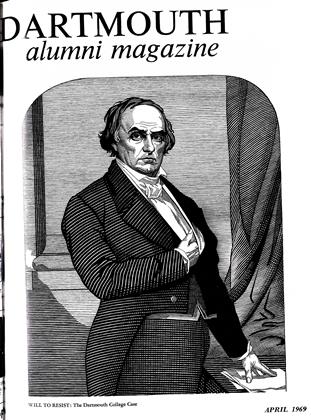Impressive in erudition, competent in execution, excitingly controversial, pragmatic in economic theory! These phrases partly describe the unfolding career of MARTIN C. ANDERSON '57, who is now ensconced in the White House as a special assistant to President Nixon.
A Phi Beta Kappa selection, Martin chose the difficult Tuck-Thayer program for his graduate work. At its conclusion he was presented the Charles F. and Ruth D. Goodrich Prize, awarded annually to the student with the highest all-around record in the Thayer program. He was also the recipient of the Westinghouse Fellowship. And, at the close of his last academic year he was granted a Ford Foundation Fellowship, to be used at M.I.T. for predoctoral study in industrial economics.
The dragon he elected to slay in his doctoral thesis was Urban Renewal. This started out to be a purely statistical study, but his accumulation of tables and graphs brought him to the conclusion "that the figures didn t seem to be right. The program called for spending the astronomical sum of $25 billion in the cities. I decided to find out how this tremendous outlay might affect the capital markets." The result was a book on the urban renewal program, published by the M.I.T. Press in 1964 under the title The Federal Bulldozer. This caused a panic among urbanologists. The treatise was the basis for an article in the Harvard Business Review under the title of Fiasco of Urban Renewal."
One immediate reaction came from the head of the Boston Redevelopment Authority, Edward J. Logue, who rather contemptuously dubbed Anderson as a little squirt." The young man's mild retort was that I understand that the head of the Authority, Mr. Logue, was in a sensitive position, and I appreciate that my book didn't make his job any easier." But no abject apologies were forthcoming. The Anderson diatribe was praised by Barron's and Nation's Business, and the Saturday Review reported that "the book had made its author the focus of controversy."
Meanwhile Anderson had moved into a professorship at Columbia University, teaching courses in finance. From this post in early 1968 he was drafted into the task force of Richard Nixon, then seeking the presidential nomination He became a valuable member of the campaign team as a researcher on domestic issues, supplying the speech writers with practical economic data which Nixon used in spelling out the malaise of the country, and what could be done about it.
Significantly, with the successful end of the political battle last November Richard Nixon saw fit to move this youthful group of idea men intact into the west wing of the White House. There Anderson has become a member of the "youngest brain trust" ever to invade the Washington scene.
He is designated as Special Assistant to the President and works closely with Arthur F. Burns, Counselor to the President, who has informal Cabinet rank. Much time and attention is being paid to the Office of Program Development which deals with broad domestic issues and policies. Anderson's previous jousts with Urban Renewal have been placed in limbo as a consequence of this broadening of his assignments. However, he does attend the meetings of the Urban Affairs Council and attends hearings which might affect upcoming legislation.
Anderson's physical orbit is presently circumscribed by the limits of the White House grounds where "we are putting in fifteen-hour days and seven-day weeks." Occasionally he sees a '57 classmate, Kent Crane, who has been named Special Assistant to Vice President Agnew.
 View Full Issue
View Full Issue
More From This Issue
-
 Feature
FeatureWILL TO RESIST
April 1969 By RICHARD W. MORIN '24 -
 Feature
FeatureThe New Dean of the College...
April 1969 -
 Feature
FeatureCongress Authorizes National Medal
April 1969 -
 Class Notes
Class Notes1933
April 1969 By ERNEST S. DAVIS JR., WESLEY H. BEATTIE -
 Class Notes
Class Notes1930
April 1969 By CHARLES V. RAYMOND, G. WARREN FRENCH -
 Class Notes
Class Notes1955
April 1969 By JOSEPH D. MATHEWSON, RANDOLPH J. HAYES







